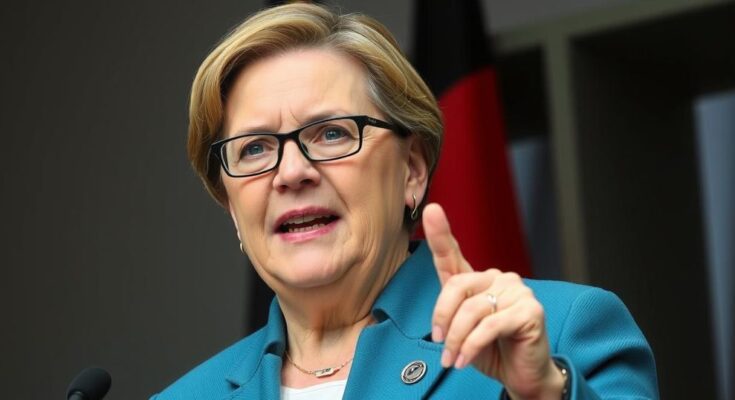The far-right Alternative for Germany (AfD) has nominated Alice Weidel as its candidate for chancellor in the upcoming election. Despite facing political isolation from other parties, the AfD has gained significant support and is currently polling as the second strongest party in Germany. Weidel aims to revitalize the country’s economy and enforce stricter immigration policies, amid increasing discontent towards Chancellor Olaf Scholz’s government.
On Saturday, the far-right Alternative for Germany (AfD) party publicly announced its candidate for chancellor for the forthcoming election. Alice Weidel, an economist and a prominent figure within the party, accepted the nomination amidst a backdrop of rising approval ratings for the AfD, which currently stands as the second-largest political force in Germany, trailing only the center-right Christian Democrats. Despite the challenging political landscape, where collaborations with other parties seem improbable, Weidel expressed her intention to rejuvenate Germany’s economy, reverse the shift toward climate-friendly energy policies, and enforce strict immigration controls.
The AfD has solidified its position in the political arena since its inception in 2013, largely due to its hardline anti-immigration stance, which resonated with a significant segment of the electorate amidst growing discontent with the current government led by Chancellor Olaf Scholz. “We want to bring Germany forward again. We want to be at the top again worldwide,” Weidel stated as she embraced her nomination. Adding to the political turbulence, the coalition government has faced substantial challenges, leading to a confidence vote expected on December 16, with an election scheduled for February 23, 2024.
The AfD achieved unprecedented success by winning a state election for the first time in Thuringia last September, driven by heightened anti-immigration sentiments and public dissatisfaction with the government’s handling of economic issues and military aid directives. It is noteworthy that the AfD’s influence is markedly stronger in eastern Germany, where branches of the party are under surveillance from domestic intelligence authorities due to extremist affiliations. Other notable candidates for the chancellery include current Chancellor Olaf Scholz from the Social Democrats, Friedrich Merz from the Christian Democrats, and Robert Habeck representing the Greens.
The Alternative for Germany (AfD) party has emerged as a significant player in the German political framework, especially since the collapse of Chancellor Olaf Scholz’s coalition government. Established in 2013, the AfD has garnered attention for its far-right ideologies, particularly its staunch anti-immigration views. The current political climate is characterized by widespread dissatisfaction regarding economic challenges and immigration policies, contributing to an increased popularity for far-right sentiments within the electorate. This upcoming election marks a critical juncture for the AfD as it positions itself with a nominated candidate for chancellor, whereas traditionally, such nominations have been absent from the party’s strategy. The political landscape is further complicated by public unrest regarding Scholz’s government, known for infighting and inflation, leading to a consequential shift in voter sentiment.
In summary, the nomination of Alice Weidel as the chancellor candidate for the AfD represents a pivotal moment for the far-right party in Germany, highlighting its growing influence and the public’s discontent with traditional political structures. The AfD’s focus on economic recovery, immigration reform, and a departure from current energy policies resonates with a troubled electorate, setting the stage for a highly competitive election. As the political climate shifts leading towards the February election, the AfD will likely continue to attract attention, particularly given its historical successes in state elections and its strategic positioning in a fallout from the coalition government’s instability.
Original Source: abcnews.go.com




